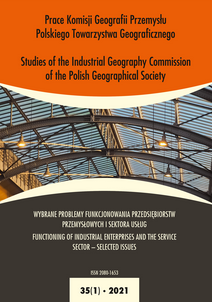Motywy internacjonalizacji polskich przedsiębiorstw produkcyjnych
Motives for internationalisation of Polish production companies
Author(s): Ireneusz DrabikSubject(s): Business Economy / Management, International relations/trade, Marketing / Advertising
Published by: Wydawnictwo Uniwersytetu Komisji Edukacji Narodowej w Krakowie
Keywords: company; international management; internationalisation; motive;
Summary/Abstract: Based on a critical analysis of the literature, the theoretical part of the paper presents the essence and basic classifications of the motives for internationalisation of a company’s activity. Attention is drawn to the opinion that companies use internationalisation as a tool for achieving a specific overriding goal meaning an increase in sales and profit and in the company value. It should be noted, however, that in practice there is usually a multiplicity of goals (e.g. winning new markets, maintaining or building a competitive position, etc.). At the same time, it is indicated that there are different classifications of detailed motives including internal and external stimuli, as well as active and reactive ones. Regardless of the adopted classification, it may be assumed that individual motives are an important element of shaping the company’s strategy for growth and gaining the competitive edge in the international environment. While the issue of motives for a company’s internationalisation is exhaustively described in the theoretical aspect in the literature on international management, there are very few up-to-date and comprehensive empirical studies on the role and importance of individual motives in the process of internationalisation of Polish companies. This research gap is filled in the empirical part of the paper, which presents the results of own empirical studies aiming to identify and characterise the motives for internationalisation of Polish production companies. The research was conducted using the postal survey method. The results point to the dominant significance of market and institutional/systemic motives in the process of internationalisation of the surveyed companies. Resource and cost motives come next. The identified motives for internationalisation have a complementary nature. Mutual feedback exists among them enhancing the tendency to internationalise the company’s activity.
Journal: Prace Komisji Geografii Przemysłu Polskiego Towarzystwa Geograficznego
- Issue Year: 35/2021
- Issue No: 1
- Page Range: 9-25
- Page Count: 17
- Language: Polish

